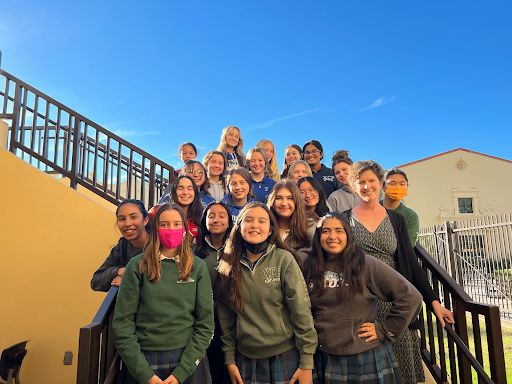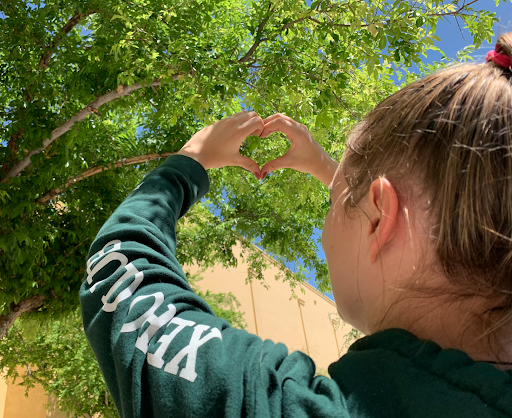XERO Club and Earth Day: Standing as Earth’s allies among unprecedented foes
April 13, 2022
Introducing XERO Club

Xavier’s XERO Club poses outside for their club picture. XERO Club is composed of students from all grade levels who are passionate about learning about environmental problems and implementing sustainable solutions.
In his 1971 book, “The Lorax,” Theodor Seuss Giesel, most prominently known as Dr. Seuss stated,“Unless someone like you cares a whole awful lot, nothing is going to get better. It’s not.” Sagaciously written in a time when environmentalism was on the rise, Dr. Seuss foretold the efforts and the motto of Xavier College Preparatory’s Xavier Environmental Response Organization (XERO) Club.
XERO Club has been an essential part of Xavier beginning from the 1980s. Current moderator Catherine Robbins became involved in XERO Club during her first year at Xavier, in 2012. Since then, not much has changed so as not to deviate from the club’s original foundation.
Robbins said, “The essential goal has always been the same, but the activities and the way we go about some of those pursuits have changed over the years.”
President of XERO Club, Gema Sanchez Gamez ’22, mentioned that a most recent purpose of the club is to “dial down the panic of climate change and of feeling like we’re not doing enough.” XERO Club strives to create community safe spaces where any person can talk about the struggles or challenges of being environmentally-friendly.
The club not only discusses problems and solutions in the big-picture setting of the world, but also within school and everyday life, where small, “trivial” actions account to great measures.
But what exactly are those problems discussed? There is a variety to select from: burning fossil fuels, *fast fashion, unsustainable consumer culture, overfishing, deforestation, contamination and food waste are some of the most recognized problems.
However, the most critical and impactful problem is climate change because it does not result in solely one problem, according to AP Environmental Science teacher Sarah Schimp.“Global warming is one of the effects of climate change, but there are many effects.”
As a result of climate change, certain ecosystems become more vulnerable to challenges such as sea-level rise, droughts and floods. This leads to the suffering of existing forms of life due also to acute climates and unavailable or polluted life sources. Consequently, displacement becomes widespread as a search for a stable and secure safe haven most often proves futile as transportation and legislation make it difficult for certain groups to enter safer regions.
With the aforementioned problems and the increased imploring of solutions, the stress of the gravity and enormity of the world can reasonably be expected to take a toll on some. After all, how much of a difference can one person or organization truly make for the benefit of the environment? Robbins said, “XERO Club firmly believes that even the smallest awareness or action can bring more light and aid to the world’s environmental need.”
Some of the “small” actions that the club took before Covid-19 were collecting the recycling bins around campus for service hours and selling reusable materials, such as straws, for $1.00. Prior to selling straws, XERO Club sold daisies; however, realizing that selling flowers that only lasted one day was unsustainable, the club switched its inventory to sell reusable items like straws. The profits made from the sales were placed back into the XERO Club account to replace the money taken out to purchase materials to sell.
Gamez says, “It’s important to care about the environment because even though so many of us at Xavier have the resources to live in places that aren’t affected by these things, the people who are affected – people who live close to the equator, farmers, people who don’t have resources to move – need to be protected.”
Currently, XERO Club participates in more hands-on and informative activities. Recently, the club talked about how to store food properly. Although it may not sound like an enormous difference, the science behind it is beyond logical. “We throw away so much food constantly and there is so much energy that goes into creating that food. It’s a waste to throw it away,” said Gamez.
Throughout the year, XERO Club has also planted flowers, refurbished benches that were made from Xavier’s old trees, painted egg cartons, tested Xavier’s air quality and made natural cleaners. Gamez said, “XERO Club focuses on educating people, but also making it fun.”
Sanchez concluded, “What I want people to take away from the club is a community more than anything. When we feel guilty about certain things or maybe not being as sustainable as we should be we hide that and we don’t share it with people. I want people to take away that being sustainable can be fun and easy and it doesn’t always have to be expensive. The best way to find those resources is being in a community and surrounding yourself with people who feel the same way.”
*Fast fashion is the term used to describe apparel companies that sell cheap garments while underpaying their workers and leaving them in horrible conditions. Additionally, the dyes that fast fashion companies use are very contaminating and, yet, they are thrown in water sources.
Earth’s Fans and Aficionados
Imagine stumbling into a room replete with celebrities such as Leonardo DiCaprio, Zac Efron, George Clooney, Millie Bobby Brown, Pierce Brosnan and Jane Goodall. Any groupings or patterns – popularity, profession and good looks aside?
As Earth involuntarily continues to tread a dangerous path, the previously mentioned celebrities, and various others, have taken it upon themselves to come to Earth’s rescue through a variety of methods.
DiCaprio, for example, created the Leonardo DiCaprio Foundation, aimed to “protect the well-being of all of Earth’s inhabitants.” Additionally, the “Titanic” actor raises awareness through speaking for the earth’s well-being in shows or interviews. Eight years ago in the comedic daytime show, “Ellen,” Dicaprio spoke about his foundation and its aim of protecting endangered species and their ecosystems. Ironically, he spoke about protecting sharks even though he had a near-death encounter with a great white shark as it swam into a cage that he was in.
Efron also took environmentalism to the next level in filming “Down to Earth with Zac Efron.” In the Netflix documentary series, Efron ventured to various places of the globe in hopes of finding sustainable practices while bringing awareness to domestic problems of the places visited.
Marvelous late actress Betty White was also a very successful environmentalist and focused primarily on protecting wildlife.
In fact, Efron and White teamed up with Taylor Swift, Danny DeVito and Ed Helms in the 2012 Universal Pictures movie “The Lorax,” an animated adaptation of Dr. Seuss’ original book. The childhood movie of many, “The Lorax” portrays the greed of corporations and their effects on the environment, allowing people of all ages to learn about some of the sources that start environmental chaos.
Pixar, Disney and 20th Century Studios have additionally left their footprint in the environmental-movie industry with revealing movies such as “WALLE,” “The Good Dinosaur,” and “Ferngully: The Last Rainforest.”
Alongside these movie titans, Legendary Pictures aroused a great deal of awareness for environmental displacement with its Academy Award-winning movie “Dune.” The film brought attention to the effects of a degrading environment by including characters meant to portray refugees of displacement, colonization and subjugation.
Other movies critiquing the direction of the world in the environmental sector include “Interstellar,” “Finch,” and “Erin Brockovich.”
It is not only movie stars and films that are making a difference. Singers are also bringing their game with new music, both in content and titles.
Pitbull, most commonly known as Mr. Worldwide, labeled his past albums Global Warming, Climate Change, Globalization, Meltdown and International Takeover. In an interview with Jimmy Fallon, Pitbull discussed his intentions to bring awareness to the problems facing the environment.
Late singer Michael Jackson also dedicated his music to the earth, most prominently in his 1982 song “Earth Song.”
Although not explicitly mentioned in the song by Louis Armstrong, “What a Wonderful World” brings nostalgia to his audience as listeners imagine the world before extreme pollution; a world full of lush green trees, brightly colored red roses, rolling clouds of white and never-ending skies of blue.
Solutions
XERO Club officers Reyna Silva ’23, Alma Melendez ’23 and Isabella Zacarias ’23 prepare for the club’s Earth Day party. The celebration included watching “Seaspiracy” and voting for next year’s officers.
Though cliché, there remains value and truth in saying Earth Day is every day and its inhabitants must strive each day to keep it clean. No matter how big or how small, actions matter if one gives them their all.
Although uniquely beautiful and wonderfully diverse, the world cannot afford to think differently about the dangers Earth faces due to environmental issues. Various excuses have risen to delay much-needed change and divisions have polarized many people.
“One prevalent excuse people use is grouping sustainability with a certain political party and rooting against it,” said Gamez.
Furthermore, an exaggeration of labels, such as the infamous use of “treehugger” only proves how divided the world continues to become in what should be a cohesive effort to save it.
Though the word “regret” stems from German roots, all parts of the world will fall to regret if neither unity nor action, whether small or big, is promoted. However, given the condition that Earth is in, large action is most helpful.
Robbins states, “We can be really effective at changing the way we use resources through legislation. It has to happen through our government. One of the things we can do is to make a concerted effort to contact our elected officials who seem to be bent on burning oil and drilling for more of it when it would be much more advantageous to turn to an alternative source.”
Renewable energy is present in various methods, Schimp elaborated. “Solar, wind, geothermal, technically nuclear energy – but it has pros and cons – wave and tidal sources.”
It is vital to keep in mind that simple actions can have effects and that those effects are not unique to themselves. Either directly or indirectly, one environmental problem is responsible for another, the latter of which may not always be related to the environment, but to other forms of life.
In the end, being environmentally friendly is not just for ourselves and for our future, it is for others as well. As stewards of the earth, everyone is called to take responsibility and care of the environment, just as someone would take care of his or her own individual home.
Robbins says, “I remember hearing someone ask, ‘What can I do to make the world better?’ And I said, ‘You have to look within. You have to improve yourself.’ And if we could all do that, if we could all care about others as much as we care about ourselves, then we wouldn’t be able to act in a way that’s disrespectful to others and towards our shared home.”
As one of its core missions, Xavier strives on teaching its students about these very same values that lead to caring for others. Xavier fosters an atmosphere where education is fulfilled not only academically, but also morally, stressing the importance of service for love and respect for each other through teaching imperative values for the good of the world.
Robbins said, “The Earth is a shared resource that we all rely on for the essentials of living; clean water, clean air and healthy food are things that we all need in order to have a good life. We also need them to contribute back to society. If we’re sick, breathing air that is not optimal, we can’t think well and we can’t work well, and our quality of life is reduced. And so, we do it for each other.”
It’s up to us to help others, despite any and all factors that make us different. Dr. Seuss brilliantly says, “To the world you may be one person, but to one person you may be the world…. And will you succeed? Yes! You will, indeed! (98 and ¾ percent guaranteed.) KID, YOU’LL MOVE MOUNTAINS!”

